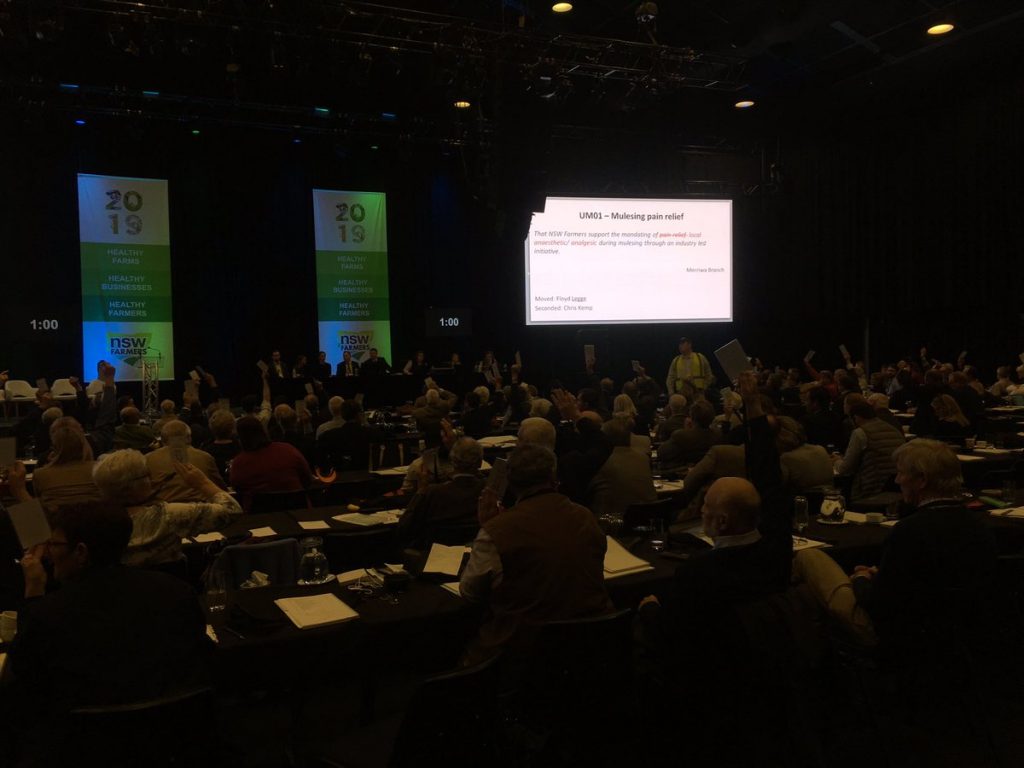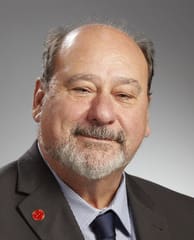
NSW Farmers delegates vote after the mulesing pain relief debate. Image – Josh Becker, ABC, Twitter.
NSW Farmers has supported the industry-led mandating of local anaesthetic or analgesia when mulesing sheep, potentially increasing the likelihood of state government support.
In a move aimed at retaining sheep producers’ use of the flystrike preventative practice, NSW Farmers conference delegates voted 86 to 54 “that NSW Farmers support the mandating of local anaesthetic/analgesia during mulesing through an industry-led initiative.”
The NSW Farmers support for mandating mulesing pain relief has been welcomed by peak wool grower body WoolProducers Australia and by NSW Legislative Council Member Mark Pearson who aims to present a bill next month to mandate pain relief use when mulesing and potentially outlaw mulesing after 2021.
Opponents of the NSW Farmers motion queried the value of pain relief when mulesing and the market premiums for wool from non-mulesed sheep and those mulesed with pain relief. They also expressed fears that the policy change might lead to further regulation of other sheep husbandry practices such as tail-docking and castration.
Pain relief bill to have mulesing ban component

NSW MLC Mark Pearson
Mr Pearson said it was great that a majority of the NSW Farmers delegates supported the motion, but he was disappointed that more of a majority did not.
“I’m actually quite thrilled, because I think what it will mean now is that the government will support my bill that is being drafted at the moment to make pain relief mandatory for all surgical procedures where pain relief is available.
“I would hope to bring that either in the second sitting week of August or the first sitting week of September, I think it will move quite quickly,” he said.
“The controversial part of the bill will be it being an offence to mules a lamb as of the 1 January 2022, that will be the other part of the bill.
“That will be the one that will cause the most fire this time, I think the pain relief will go through quite easily.”
Mr Pearson said the mulesing offence part of the bill would give two years from January 2020 for wool growers to proactively and assertively breed enough wrinkles out of the sheep in order to render the sheep or the lambs resistant to flystrike, as if it has been mulesed.”
He said pain relief should be “a given ethical procedure,” rather than a consideration of wool sale premiums or economics.
Pain relief vs anaesthestic/analgesia
In a lively debate at the NSW Farmer’s annual conference in Sydney, members first amended the initial urgency motion to substitute the words ‘pain relief’ with ‘anaesthetic/analgesia’.
The motion follows a survey in which more than 80 percent of NSW sheep producers surveyed supported mandating pain relief for mulesing either through an industry-led initiative or government regulation.
It also means that NSW Farmers’s stance on the issue is now consistent with the policy direction of peak wool grower body WoolProducers Australia, which is seeking to mandate pain relief for mulesing nationally.
NSW Farmers motion formalises industry practice – WPA

WoolProducers president Ed Storey
WPA president Ed Storey said the NSW Farmers policy change was a formalisation of what most sheep producers were doing now ie. using pain relief when mulesing sheep.
“For 80-90 percent of people to be voluntarily using pain relief is fantastic.
“We want to try to make it mandatory, which will be a great signal to our customers overseas.”
Mr Storey said WPA had written to the federal animal welfare taskforce to progress its policy on pain relief for mulesing.
“It could mean tweaking of existing legislation in the states.”
NSW Farmers president James Jackson said the Association’s mulesing policy is focused on protecting the practice to ensure all farmers have access to effective flystrike management techniques and the highest welfare outcomes are achieved.
“Our members’ decision to support mandating pain relief during mulesing through an industry initiative demonstrates our commitment to protecting the practice.
“Mulesing is critical to the Australia sheep industry without an effective alternative for all farmers,” Mr Jackson said.
“Our members are concerned by movements in the market to demand non-mulesed wool.
“This step to support industry driving the mandating of pain relief highlights the need to actively defending the practice,” he said.
“Industry must drive this initiative and explain to the market the positive welfare outcomes that mulesing with pain relief delivers.”
“It is time that industry started to deliver farmers with a solution to this vexed issue. This is an issue that industry must drive and we are committed to this.”
Mr Jackson said that mulesing is a difficult topic for the Australian sheep industry and there are many varying views within the Association.
“The association has run a process to understand our members’ views and today the decision has been made.”

While agreeing with the use of pain relief and it’s use being made mandatory. I am totally opposed to the banning of mulesing, as in the larger grazing acreage areas it is not practical nor in the best interest humanely of the sheep. If the procedure is done proficiently the animal recovers quickly and has lifetime protection. Having attempted to go mules free and seen first hand the problems that arose in relatively plain sheep I would not entertain not mulesing . Bush flies inhibiting growth , shear cuts causing infections, frustration and tougher shearing conditions for shearer’s, increased use of chemicals at a time when I believe we are using too many anyway , which in turn restricts some marketing options. As well there is the increase in labour needed to carry out the the added husbandry work .